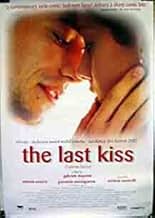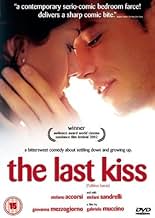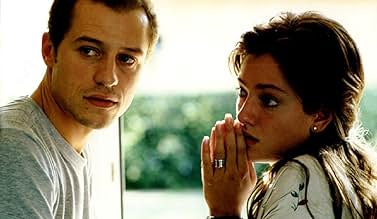IMDb RATING
6.9/10
8.9K
YOUR RATING
Carlo's life is thrown into a tailspin when his longtime girlfriend Giulia announces she's pregnant. As Carlo faces up to his anxieties about adulthood, his buddies Paolo, Adriano and Albert... Read allCarlo's life is thrown into a tailspin when his longtime girlfriend Giulia announces she's pregnant. As Carlo faces up to his anxieties about adulthood, his buddies Paolo, Adriano and Alberto reluctantly grapple with their own responsibilities.Carlo's life is thrown into a tailspin when his longtime girlfriend Giulia announces she's pregnant. As Carlo faces up to his anxieties about adulthood, his buddies Paolo, Adriano and Alberto reluctantly grapple with their own responsibilities.
- Awards
- 16 wins & 14 nominations
Pierfrancesco Favino
- Marco
- (as Pier Francesco Favino)
Storyline
Did you know
- TriviaItalian censorship visa # 95133 delivered on 1 February 2001.
- ConnectionsFollowed by Baciami ancora (2010)
Featured review
[s p o i l e r s]
You have to admit there's much that's life affirming and technically accomplished in Gabriele Muccino's movies about superficial Italians coupling and uncoupling. His scenes never stop moving, and his camera has learned to keep up with the flow. Undoubtedly his most polished effort so far is L'ultimo bacio (The Last Kiss). A box office success in Italy and abroad (though not a critical one), The Last Kiss is a splendid operatic swirl of melodramatic ensemble acting and liquid editing. Its succession of slick, fast-talking, emotional roller coaster scenes is a beautiful thing to watch. It's got irresistible rhythm if you don't mind that the high energy leads to an awful lot of yelling. The episodic structure and musical links may owe something to P.T. Anderson's Magnolia; but this is Italy and it all works differently. It isn't about anomie and chance encounters: everyone's connected. The Last Kiss is a well-oiled machine with jaw-dropping energy.
Its action is so lively, its motion so perpetual, you may fail to notice what a stagnant society The Last Kiss represents - how complacent the characters and their creator are. The way they buckle down and accept the mind-numbing `comforts' and intellectual limitations of Berlusconi's Italy. It's a place they all seem destined to accept as the best of all possible worlds.
The Last Kiss revolves (almost literally: the steadicam pans from scene to scene while operatic music swims across the transitions) around five young men about to turn thirty in a provincial town. At the center is Carlo (Stefano Accorsi). His fiancée Giulia (Giovanna Mezzogiorno) is pregnant and he can't face the prospect of a wife, a child, and a house. He's not ready to grow up. Most of Carlo's buddies have the same problem. Paolo (Claudio Santamaria) goes through the death of his father right after he's had an angry breakup with his girlfriend, and he can't face going into the family religious object business. The mercurial Adriano (Giorgio Casotti) has a young child and a ball-buster wife (Livia, Sabrina Impacciatore) and these challenges have him fed up with his marriage and ready to leave it. Alberto (Marco Cocci), a dreadlocked, joint-smoking Greenpeace hippy, amuses himself seeing how many women will jump into bed with him; he's a sciupafemmine, a Don Juan who chews them up and spits them out: marriage is not on his horizon.
But Marco (Pierfrancesco Favino) is getting married: he's buying into the normal life. Marco's four friends are all at Marco's wedding, and it's there that Carlo meets Francesca (Martina Stella), a tantalizingly delicious blonde schoolgirl who successfully puts the make on him. Meanwhile Giulia's mother Anna (a simpatica Stefania Sandrelli) is fed up with her taciturn psychiatrist husband Emilio (Luigi Emilio) and goes through her own period of rebellion, trying to revive an affair of three years ago with a college professor (Sergio Castellitto).
Carlo gets his wild night with Francesca, his `last kiss' which turns into more than that after Giulia finds out and they have a big fight (where the movie's yell-fest reaches fortissimo). He runs back and sleeps with the 18-year old, and then spends the rest of the movie trying to patch things up and get his life back on its track. Meanwhile Adriano, Alberto, and Paolo are planning to run off to Africa, or somewhere-an escape that's really a last fling: but their whole series of tantrums and complaints are background noise, an obligato to the main themes. The focus is on Giulia's mother, Adriano, and Carlo. Where the movie is really headed for its finale is to Carlo and Giulia reuniting, and a soothing voiceover from Carlo about how nice it will be to have grass and a suburban house and kids. . .and all the rest, and the two of them are reconciled at her parents' house where Anna is back with her father. It seems that Adriano really has left his wife, for a while anyway, but that subject is dropped.
Closely examined, despite its Magnolia-like intercutting of related subplots, its splendid cast and beautiful look, The Last Kiss reveals a worldview that's numbingly vapid. Its young men on the verge of thirty and one older woman in revolt against the ordinary paths they've chosen only play at escape: the final sequence is a corny affirmation of comfortable bourgeois family life, big house, big car, perfect bambini. Anna is back with Giulia's father. Her little revolt is over.
What is the theme that unifies Muccino's movies? Is it coming of age, as in Come te nessuno mai, or is it playing at revolution, as in that same rather charming first film about high schoolers staging a Sixties-style strike while what the boys really want is only to get laid? If Come te is Muccino's freshest and most unassuming effort, Ricordati di me, his most recent one, is his cheesiest: again, a swirl of stories about individuals in a family who are all in revolt against their lives - and come back to conventionality at the end - but with much tackier subplots. He's made a trilogy: (1) first sex, (2) last infidelity before marriage, (3) first infidelity after, with being aTV go-go dancer treated as a viable life choice. The theme is simply: revolt a little, it'll make you feel better. `Normality is the true revolution.'
Italians who remember the great directors of the past shake their heads at such stuff. The idea that all temptations to rebel end in a little reconciliation is complacent even for TV sitcoms. It's as if Muccino has all this promise as a filmmaker - he can orchestrate his subplots in such an entertaining way and the editing is inspired - he's a real Robert Altman with a Tuscan accent - but his head is too empty; there's no there there.
Muccino's characters, for all their charm and good looks, are pretty silly people. Carlo, Last Kiss's main character, is attractive in his way but his shit-faced grin palls: he's an airhead to be tempted by Francesca, the blonde Lolita, because she's an airhead too, just a pretty schoolgirl who confuses wanting to get laid with finding the love of her life. There's no edge to the temptation, because Francesca's pull on Carlo was so superficial. It's lively and glossy and it has moments of flirting with satire and farce, the sheer energy of it can be lots of fun to watch, but when you get down to it, Last Kiss is on the level of a TV sitcom. In fact American cable network dramas arguably go deeper than this. Is Muccino the best that mainstream Italian cinema can now produce? Let's hope not.
You have to admit there's much that's life affirming and technically accomplished in Gabriele Muccino's movies about superficial Italians coupling and uncoupling. His scenes never stop moving, and his camera has learned to keep up with the flow. Undoubtedly his most polished effort so far is L'ultimo bacio (The Last Kiss). A box office success in Italy and abroad (though not a critical one), The Last Kiss is a splendid operatic swirl of melodramatic ensemble acting and liquid editing. Its succession of slick, fast-talking, emotional roller coaster scenes is a beautiful thing to watch. It's got irresistible rhythm if you don't mind that the high energy leads to an awful lot of yelling. The episodic structure and musical links may owe something to P.T. Anderson's Magnolia; but this is Italy and it all works differently. It isn't about anomie and chance encounters: everyone's connected. The Last Kiss is a well-oiled machine with jaw-dropping energy.
Its action is so lively, its motion so perpetual, you may fail to notice what a stagnant society The Last Kiss represents - how complacent the characters and their creator are. The way they buckle down and accept the mind-numbing `comforts' and intellectual limitations of Berlusconi's Italy. It's a place they all seem destined to accept as the best of all possible worlds.
The Last Kiss revolves (almost literally: the steadicam pans from scene to scene while operatic music swims across the transitions) around five young men about to turn thirty in a provincial town. At the center is Carlo (Stefano Accorsi). His fiancée Giulia (Giovanna Mezzogiorno) is pregnant and he can't face the prospect of a wife, a child, and a house. He's not ready to grow up. Most of Carlo's buddies have the same problem. Paolo (Claudio Santamaria) goes through the death of his father right after he's had an angry breakup with his girlfriend, and he can't face going into the family religious object business. The mercurial Adriano (Giorgio Casotti) has a young child and a ball-buster wife (Livia, Sabrina Impacciatore) and these challenges have him fed up with his marriage and ready to leave it. Alberto (Marco Cocci), a dreadlocked, joint-smoking Greenpeace hippy, amuses himself seeing how many women will jump into bed with him; he's a sciupafemmine, a Don Juan who chews them up and spits them out: marriage is not on his horizon.
But Marco (Pierfrancesco Favino) is getting married: he's buying into the normal life. Marco's four friends are all at Marco's wedding, and it's there that Carlo meets Francesca (Martina Stella), a tantalizingly delicious blonde schoolgirl who successfully puts the make on him. Meanwhile Giulia's mother Anna (a simpatica Stefania Sandrelli) is fed up with her taciturn psychiatrist husband Emilio (Luigi Emilio) and goes through her own period of rebellion, trying to revive an affair of three years ago with a college professor (Sergio Castellitto).
Carlo gets his wild night with Francesca, his `last kiss' which turns into more than that after Giulia finds out and they have a big fight (where the movie's yell-fest reaches fortissimo). He runs back and sleeps with the 18-year old, and then spends the rest of the movie trying to patch things up and get his life back on its track. Meanwhile Adriano, Alberto, and Paolo are planning to run off to Africa, or somewhere-an escape that's really a last fling: but their whole series of tantrums and complaints are background noise, an obligato to the main themes. The focus is on Giulia's mother, Adriano, and Carlo. Where the movie is really headed for its finale is to Carlo and Giulia reuniting, and a soothing voiceover from Carlo about how nice it will be to have grass and a suburban house and kids. . .and all the rest, and the two of them are reconciled at her parents' house where Anna is back with her father. It seems that Adriano really has left his wife, for a while anyway, but that subject is dropped.
Closely examined, despite its Magnolia-like intercutting of related subplots, its splendid cast and beautiful look, The Last Kiss reveals a worldview that's numbingly vapid. Its young men on the verge of thirty and one older woman in revolt against the ordinary paths they've chosen only play at escape: the final sequence is a corny affirmation of comfortable bourgeois family life, big house, big car, perfect bambini. Anna is back with Giulia's father. Her little revolt is over.
What is the theme that unifies Muccino's movies? Is it coming of age, as in Come te nessuno mai, or is it playing at revolution, as in that same rather charming first film about high schoolers staging a Sixties-style strike while what the boys really want is only to get laid? If Come te is Muccino's freshest and most unassuming effort, Ricordati di me, his most recent one, is his cheesiest: again, a swirl of stories about individuals in a family who are all in revolt against their lives - and come back to conventionality at the end - but with much tackier subplots. He's made a trilogy: (1) first sex, (2) last infidelity before marriage, (3) first infidelity after, with being aTV go-go dancer treated as a viable life choice. The theme is simply: revolt a little, it'll make you feel better. `Normality is the true revolution.'
Italians who remember the great directors of the past shake their heads at such stuff. The idea that all temptations to rebel end in a little reconciliation is complacent even for TV sitcoms. It's as if Muccino has all this promise as a filmmaker - he can orchestrate his subplots in such an entertaining way and the editing is inspired - he's a real Robert Altman with a Tuscan accent - but his head is too empty; there's no there there.
Muccino's characters, for all their charm and good looks, are pretty silly people. Carlo, Last Kiss's main character, is attractive in his way but his shit-faced grin palls: he's an airhead to be tempted by Francesca, the blonde Lolita, because she's an airhead too, just a pretty schoolgirl who confuses wanting to get laid with finding the love of her life. There's no edge to the temptation, because Francesca's pull on Carlo was so superficial. It's lively and glossy and it has moments of flirting with satire and farce, the sheer energy of it can be lots of fun to watch, but when you get down to it, Last Kiss is on the level of a TV sitcom. In fact American cable network dramas arguably go deeper than this. Is Muccino the best that mainstream Italian cinema can now produce? Let's hope not.
- Chris Knipp
- May 3, 2004
- Permalink
- How long is The Last Kiss?Powered by Alexa
Details
Box office
- Gross US & Canada
- $1,048,950
- Opening weekend US & Canada
- $33,561
- Aug 18, 2002
- Gross worldwide
- $17,784,993
- Runtime1 hour 55 minutes
- Sound mix
- Aspect ratio
- 2.35 : 1
Contribute to this page
Suggest an edit or add missing content


































